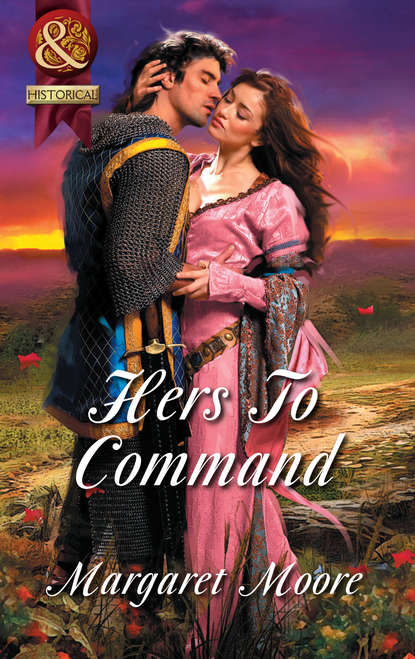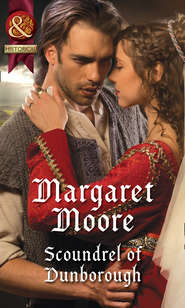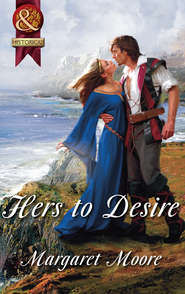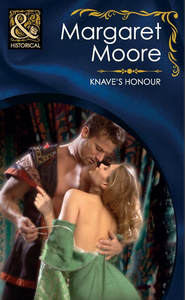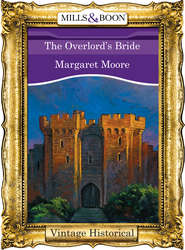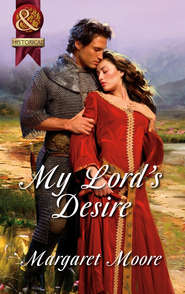По всем вопросам обращайтесь на: info@litportal.ru
(©) 2003-2025.
✖
Hers To Command
Настройки чтения
Размер шрифта
Высота строк
Поля
“Cerdic’s family was royal before the Normans came,” she replied.
She obviously admired the fellow. Henry wondered just how much, and if that extended to being on intimate terms. Not that it mattered. He had no interest in the bold and brazen Lady Mathilde. “You’re from Provence, aren’t you?” he asked, commenting on her accent.
“Yes, we were born there and lived there for most of our childhood.”
Just like the queen Henry detested, the woman he believed was spurring his countrymen to rebellion with her selfish advancement of her own family.
“The same as Queen Eleanor,” he remarked, wondering how she’d react to that.
Lady Mathilde looked as if she disliked the queen as much as he did. “If what Papa said about her family is true, it is a pity for England she is married to the king.”
That was interesting. “What did your father say about her family?”
“That the only thing they produced was beautiful women, and the only intelligence they showed was in arranging marriages.”
That was so close to the mark, Henry had to laugh. Then, because he was Henry, he smoothly said, “The queen’s family isn’t the only one capable of producing beautiful women.”
Lady Mathilde frowned.
Clearly, he had erred. Obviously, this lady would never be impressed with flattery or, perhaps, reminders that her sister was beautiful while she was not.
“My father didn’t like Normans, either,” she declared. “He said they always wanted to make war and didn’t appreciate music or art.”
He had upset her with his comment, and since he was well aware of what it was like to be compared to a sibling and found lacking, he didn’t take offense at her umbrage.
Her observation was also unfortunately true, at least in his case. He had little appreciation for art or music, except a clever, ribald ditty. Yet never before had he been made to feel that was a failing. “Someone has to defend the kingdom,” he noted.
“William was defending England when he invaded it? I must have been seriously misinformed.”
He would have found her remarks more amusing if she didn’t look so smugly superior. “Well, sometimes we get carried away—and sometimes, such men are necessary to defend estates.”
A blush colored her smooth cheeks, nearly overwhelming the few freckles on her nose.
“I meant no offense, Sir Knight,” she said after a moment, and looking not nearly so well pleased, “and I do not necessarily share my father’s views about the Normans. He did admire some things about your countrymen—Magna Carta, for instance, and how it set a limit on the king’s power. That is why Papa gave up all claim to his French estates to his elder brother, Roald’s father, in exchange for Ecclesford. Then Papa discovered that the English court is not very different from that of France. He was sorely disappointed.”
Henry couldn’t disagree. Noblemen were men first, and noble second, so they brought their ambition, greed, desires and needs to court with them.
“So Papa retired to Ecclesford and never went near the royal court again.”
That would explain why he’d never seen either of the ladies there, or even heard of them.
“And that is why we have no noble friends to call upon, you see, or I would not have to ask a stranger for his help.”
He suddenly felt like a lout for being annoyed with her, or anything she said. She and her sister were ladies in need of his aid, and that should be all that concerned him.
Maybe this would be a good time to do as Nicholas was always telling him, and keep his mouth shut.
Doing just that, he rode in silence beside Lady Mathilde, listening to the soldiers behind them laughing and talking. God’s wounds, they sounded more like men on a hunt than soldiers.
The man who’d trained him and his friends in the arts of war would never have tolerated such a lack of discipline. Henry could just imagine the things Sir Leonard de Brissy would say if he were here, and the curses that would accompany his comments.
“Ecclesford is on the other side of this wood,” Lady Mathilde remarked after they’d gone another mile or so, and the wind had started to rise. It tugged at the edges of the ladies’cloaks, and sent brown and yellow leaves swirling down the rutted, muddy road.
Henry noticed that the clouds were darker, too. He hoped the rain wouldn’t start before they arrived at Ecclesford. Chivalrous knight or not, he didn’t want to get soaked to the skin.
THE RAIN didn’t hold off and Henry was soaked to the skin before they reached Ecclesford Castle. He could barely see where he was going though the downpour, although he did note that the fortress had a dry moat that encircled it, except for the road leading to the large wooden gate, and only one outer wall. It was certainly not the most well-fortified castle he had ever encountered.
Once in the cobblestone courtyard, everyone hastened to dismount. Covering their heads with their arms, stableboys ran out to help with the horses. The animals snorted and refooted, their iron-shod hooves clattering on the cobblestones and adding to the din. The soldiers, grumbling about the weather, splashed heedlessly through puddles.
In the midst of the clamor, Lady Mathilde’s voice came clear and strong. “Follow me to the hall, Sir Henry,” she commanded as she headed toward a building directly across the yard.
He required no urging. Indeed, it was all he could do not to grab her arm to hurry her along.
It wasn’t just that his clothes and hair were getting wet; it was the smell of wet stone—a potent and vivid reminder of those long hours in that cold, damp dungeon when he feared he would be dragged out and executed at any moment. That scent made him relive the beatings and, worse than any physical blow, the sickening realization that the man to whom he had sworn an oath of loyalty and brotherhood did not trust him.
Once out of the driving rain, Henry handed his soaking cloak to a servant who appeared beside him, then shook himself like a dog, as if that could rid him of not just the damp, but the unhappy memories, too.
In a way, it worked, and as the fear and dismay dwindled, he straightened and took in his surroundings while Lady Mathilde bustled off, saying something about a chamber and some food.
The hall itself was small, although comfortably furnished with benches, stools and even chairs upon a raised dais at one end. The well-scrubbed tops of large trestle tables that would be set up for meals leaned against the walls, along with their bases. Bright tapestries depicting scenes of hunting and ladies in a garden lined the wall behind the dais to keep out the chill of the stone walls. There were metal sconces for torches along the walls, and great smoke and age-darkened oaken beams held up the slate roof.
Best of all, though, was the large fire burning in the central hearth. Henry went there at once and, sighing, held out his hands to the welcome warmth. They had put in wood from an apple tree, and the scent mingled with that of wet wool, damp linen and the moist rushes below his feet.
Meanwhile, Lady Mathilde flitted about giving orders like a general in the midst of battle. Lady Giselle disappeared up some curved stairs that led, he assumed, to bedchambers and dry clothes. Cerdic and the rest of the sodden escort came in and arranged themselves on the opposite side of the fire. Each and every one of them cast hostile glances at Henry as they shuffled their feet and jockeyed for a place closest to the heat.
Henry ignored them. He was used to scrutiny, whether speculative or hostile.
Once or twice a pretty and particularly buxom serving woman wearing a gown that seemed molded to her full-figured body passed by. She made no secret of her interest in Henry, surreptitiously and coyly smiling at him.
Henry was used to this, too, and he supposed she would come to his bed if he so desired. He didn’t so desire. First, it had never been his way, despite what many assumed, to fall into bed with any young woman who happened to catch his eye. Secondly, he had already discovered the few times he’d bedded a woman since his days in the dungeon that not only did making love not inspire sleep, it actually made him more wakeful. And last, but not least, he doubted the lovely and modest Lady Giselle would be inclined to accept him as a worthy suitor if he was bedding one of her servants right under her very nose.
As for any wayward fancies concerning Lady Mathilde and such activity, they were surely borne of fatigue and the unusual events of this strange day. To be sure, she was a bold and spirited woman, but not at all the sort he preferred. She was too audacious for his taste. While he was here, he would stay as far away from her as possible.
Lady Giselle appeared at the bottom of the stairs. Now she wore a gown of soft blue velvet that matched the color of her eyes. Her white, virginal veil was shot through with matching blue threads and held in place by a thin coronet made of intricately twisted gold. The long cuffs of her gown were embroidered with gold and emerald-green threads, the green matching the silken lining of the garment. A slender gilded girdle sat upon her hips.
She was the epitome of beauty, and as she paused on the bottom step, as uncertain as a fawn, he thought that he would surely be a fool not to woo and hope to wed her.
“Would you care to change your clothes?” Lady Mathilde asked, startling him out of his reverie.
He looked down to find her at his elbow, and with a disturbingly astute expression on her face. If someone were to tell him she possessed the ability to read his mind, he’d be inclined to believe it.
“There is a chamber ready for you now,” she added.
He was aware of Lady Giselle gliding toward the hearth and decided he wasn’t that wet anymore. “No, thank you, my lady. I’m quite comfortable.”
Lady Mathilde’s pursed lips revealed her reaction to that little lie—and then her eyes lit up like a bonfire on Midsummer’s Eve.
“Father Thomas!” she cried, brushing past Henry and rushing toward a middle-aged priest who’d just entered the hall.





